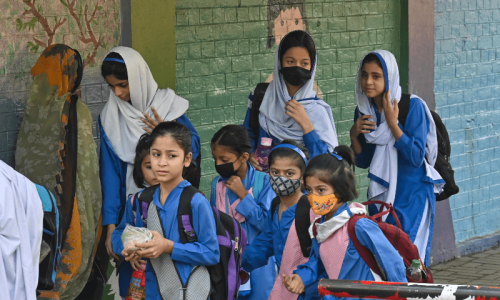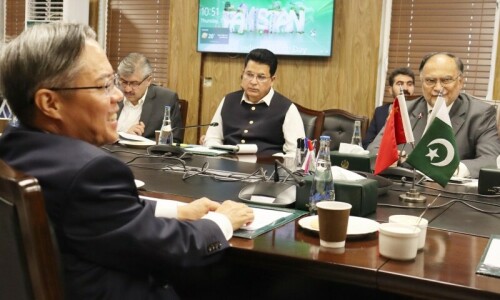CII endorses underage marriage

ISLAMABAD: Amid criticism from various quarters, including some of its own members, the Council of Islamic Ideology (CII), on Wednesday endorsed its earlier ruling that girls as young as nine years old were eligible to be married, “if the signs of puberty are visible”.
The CII meeting, chaired by Maulana Mohammad Khan Sheerani of the Jamiat Ulema-i-Islam-Fazl (JUI-F), also said that most of the clauses of the existing Muslim Marriage Law, 1961, were un-Islamic.
Talking to reporters after the conclusion of a two-day CII meeting, Sheerani criticised the Sindh Assembly, the media and ‘some other segments of society’ for not taking the council’s decisions seriously.
On March 31, the Sindh Assembly passed a resolution demanding dissolution of the CII and on April 28, the Sindh Child Marriage Restraint Bill, 2013, was enacted, which stipulates strict penalties for all parties that compel underage individuals to enter into marriage.
“The primary responsibility of the council is the ‘Islamisation’ of the country’s laws and those opposing our decisions need to reconsider their position,” Sheerani said.
Concern expressed over plight of vulnerable groups
The CII chief said marriages that were solemnised at a time when both individuals were minors were only binding if they were arranged by the wali (father or grandfather) of the two individuals. In cases where marriages were solemnised by someone other than the wali, both individuals had the option to refuse or reconsider upon achieving adulthood.
Clarifying the decision, Sheerani said that a nikah could be performed at any age, but the bride could only start living with the groom after reaching puberty.
He said laws that defined a minimum age for marriage were not Islamic and should be repealed, adding that the council would recommend that parliament amend these laws to bring them in accordance with Islamic principles.
Sheerani also said that section 6 of the Muslim Marriage Law, 1961, which required men to seek permission from their wives before contracting another marriage – was not in accordance with Islamic principles.
The CII had taken up the issue in an earlier meeting held on March 11, 2014, and after detailed deliberations, the points under discussion were finally endorsed on Thursday.
These decisions came even as other council members voiced serious concerns. “Who wants to know when a young girl can be married or not,” a CII member asked rhetorically. “Anybody who wants to marry a second or third time could manage to get permission. This is not an issue of public interest,” he told Dawn on condition of anonymity.
Another member said some of the more serious issues pending before the council were ignored. “We have to discuss a code of conduct to end sectarianism, the Protection of Pakistan Ordinance, the conduct of the electronic media and so many other issues, but this marriage law business has been a waste of time,” he said.
Under the Constitution, the CII chairman is the decision-making authority and he is entitled to overrule wishes of all members, if he so chooses. The CII’s decisions are not binding on parliament, but are treated as the guiding principles around which policy is generally framed.
In the same meeting, the council called for a complete ban on the sale of alcoholic beverages in the country. “Since alcohol is prohibited even by other religions, it should be banned for other religious minorities too,” Sheerani said.
On Wednesday, CII also unanimously approved a resolution presented by Maulana Tahir Ashrafi, calling upon the judiciary to look into family law matters as per the dictates of the religious beliefs of both parties.
Civil society condemns
The CII diktat drew the ire of civil society and human rights activists.
“Women and children are the most vulnerable groups in the country – if such legal cover as a minimum age prohibiting child marriages are done away with, then exploitation of women and children will increase,” Human Rights Commission of Pakistan Chairperson Zohra Yousuf told Dawn.
The head of the National Commission on the Status of Women (NCSW) was of the view that the Muslim Marriage Law had been successful and that it needed to be implemented in the true sense, instead of being quashed.
“The law was formulated after two years of research and deliberation by the scholars of all sects – so if any cleric wants to change the law, he is essentially challenging the wisdom of these ulema,” said NCSW Chairperson Khawar Mumtaz.
Published in Dawn, May 22nd, 2014














































